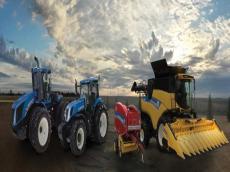|
|
TODAY.AZ / Business
Uzbekistan to create agricultural machinery in Azerbaijan and Kazakhstan
14 July 2023 [12:45] - TODAY.AZ

Uzbekistan is looking to expand its agricultural sector by establishing major assembly plants for agricultural machinery in Azerbaijan and Kazakhstan. This move is part of the country's plan to double its textile production and improve the value-added chain by 2026, Azernews reports.
This was announced during a visit by Olimkhon Rustamov, Deputy Minister of Investments, Industry, and Trade of Uzbekistan, to agricultural machinery enterprises in the Chirchik city of the Tashkent region.
"In order to expand industrial cooperation, we are planning to establish large-scale assembly plants for agricultural machinery in Kazakhstan and Azerbaijan. Negotiations with partners are already in the final stage," the ministry said.
According to the World Bank, Uzbekistan ranks among the bottom 20 countries in the world in terms of water productivity, producing only $0.6 per cubic meter of water compared with a global average of $15 per cubic meter. To improve the country's food security, the Government of Uzbekistan has emphasized wheat production and supported poultry and animal farming over the past few years.
In June 2021, Uzbekistan and Russia signed an agreement and in November 2021 launched the Agroexpress logistical corridor project, which will allow the delivery of agro-food products in refrigerator container trains within 4-7 days. In February 2022, the prime ministers of EAEU countries approved the implementation of the Eurasian AgroExpress project to facilitate trade with and expedite the delivery of agro-food products to Uzbekistan and China.
The government hopes to increase farmers' income by twice at least and ensure a minimum 5% annual growth of agriculture in 2022-2026 through intensive development programs, application of advanced scientific achievements, digitalization, and adoption of new technologies. To achieve this, the government is subsidizing the adoption of water-saving technologies and plans to save at least 7 billion cubic meters of water by 2026 through efficiency improvements.
The government also plans to offer small family farms ten-year horticulture leases on 200,000 hectares of cotton and grain land transferred from large farms and clusters and allocate $100 million for supporting loans. Moreover, loans and grants in the amount of $600 million will be attracted to digitalize agriculture, increase land fertility, and introduce modern agricultural technologies.
To further develop processing and packaging capabilities to add value to domestic and export products, the government is supporting the creation of vertically integrated clusters. As of September 2021, 463 of these clusters had been registered.
URL: http://www.today.az/news/business/237054.html
 Print version
Print version
Connect with us. Get latest news and updates.
See Also
- 25 April 2025 [19:00]
Private sector makes up 83% of GDP, says Deputy Minister - 25 April 2025 [15:39]
Deputy Minister highlights digital economy and Alat Free Economic Zone at Conference - 25 April 2025 [14:55]
Focus on Garabagh and sustainability at upcoming Baku Forum - 25 April 2025 [14:31]
ASCO hosts MEPC 83 Seminar on maritime emissions and sustainability - 24 April 2025 [15:49]
Azerbaijan, ADB discuss development priorities for next four years - 24 April 2025 [12:55]
Azerbaijan achieves major milestones in ICT development, boosts cybersecurity and talent - 24 April 2025 [11:00]
Azerbaijan’s banks shielded from US tariff impact, Fitch reports - 23 April 2025 [18:59]
CBA Governor explains impact of rising interest rates and liquidity on lending and deposits - 23 April 2025 [17:18]
Kazakhstan plans to boost oil exports from Azerbaijan with focus on environmental responsibility - 23 April 2025 [15:27]
Middle Corridor project progresses, Kazakhstan-Azerbaijan cooperation strengthens
Most Popular
 Turkiye opens new chapter in space with TÜRKSAT 6A
Turkiye opens new chapter in space with TÜRKSAT 6A
 Khankendi to host 17th Economic Cooperation Organization Summit
Khankendi to host 17th Economic Cooperation Organization Summit
 Armenia's accusations are misinformation, says Azerbaijani Defense Ministry
Armenia's accusations are misinformation, says Azerbaijani Defense Ministry
 First Indonesian Hajj pilgrims to reach Saudi Arabia next week
First Indonesian Hajj pilgrims to reach Saudi Arabia next week
 Ankara, Washington seek common ground on customs tariffs
Ankara, Washington seek common ground on customs tariffs
 China send its next space mission into orbit
China send its next space mission into orbit
 VP of Heydar Aliyev Foundation visits Chinese National Human Genome Center
VP of Heydar Aliyev Foundation visits Chinese National Human Genome Center
